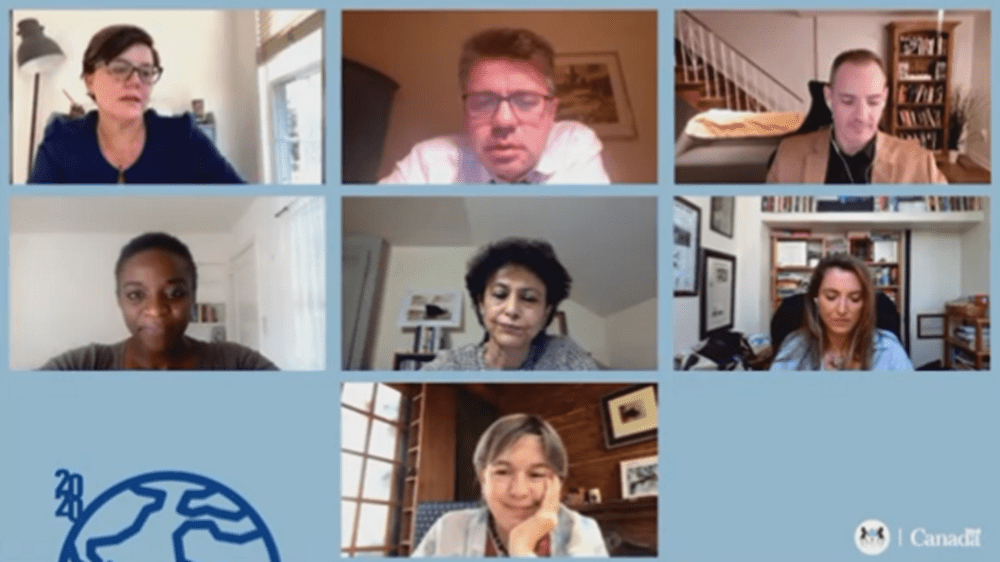Suppression of Media Freedom Correlates to the Onset of the Coronavirus Pandemic, Say Panelists
November 16, 2020 — The year 2021 will be pivotal for advancing media and press freedom initiatives, due to the converging crises affecting the future of journalism. According to panelists, there currently persists a media freedom crisis consisting of a geopolitical crisis due to the aggressiveness
Jericho Casper

November 16, 2020 — The year 2021 will be pivotal for advancing media and press freedom initiatives, due to the converging crises affecting the future of journalism.
According to panelists, there currently persists a media freedom crisis consisting of a geopolitical crisis due to the aggressiveness of authoritarian regimes, a technological crisis due to a lack of democratic securities, a democratic crisis due to polarization and disinformation, a crisis of trust due to a spreading suspicion and even hatred of the media, and an economic crisis impoverishing the quality of journalism.
It was already a challenging time for journalism before the pandemic, yet the onset of the global COVID-19 pandemic resulted in what many have labeled an infodemic, as governments around the world rushed to take control of media communications, with some limiting access to information, at a time when people needed accurate info more than ever before.
Reporters Without Borders’ 2020 World Press Freedom Index finds a clear correlation between governments’ suppression of media freedom in response to the coronavirus pandemic.
Nations increased censorship across the globe led Canada and Botswana to co-host the second annual Global Conference for Media Freedom on Monday, which featured the first Ministerial meeting of the Media Freedom Coalition, a coalition of 37 governments committed to working together to advocate for media freedom and the protection of journalists.
Pandemic become an excuse to restrict media freedoms
“In countries which already showed autocratic tendencies, COVID-19 became the perfect excuse to restrict media freedoms,” said Barbara Trionfi, executive director of the International Press Institute. According to a study conducted by IPI, “17 countries worldwide rushed to pass ‘fake news’ emergency laws over the last eight months, essentially handing autocrats new censorship tools.”
In more autocratic states new laws were written permanently into criminal or civil codes, which outlawed all forms of online misinformation, with vaguely defined provisions. Many allow prosecutors to fine journalists for publishing information deemed untrue or threatening by authorities.
“Such laws have created new possibilities for authoritarian leaders, and their law enforcement and judicial systems, to place restrictions on speech that may long outlast the pandemic,” said Trionfi.
“In Senegal and Gambia, journalists have been physically assaulted by security forces for providing information contradicting public officials,” detailed Fatou Jagne, director for Senegal and West Africa at Article 19.
Polarization and truly fake news run rampant in U.S. and Brazil
Meanwhile, in more democratic regions, like Brazil and the United States, increased polarization became a trend, as already divided populaces were divided and isolated, while fake news was permitted to run rampant online.
The year has made one thing clear: a reset in the balance of individuals as rights’ holders and the government as duty-bearers, in terms of promoting media freedom, is necessary.
In an attempt to do just that, all 37 members of the Media Freedom Coalition signed the Global Pledge on Media Freedom, committing the countries to work together on identifying and acting on violations and abuses against members of the press.
As these countries are evidently putting in the brunt of the work to promote internet freedom, much of the day-long conference was spent developing best practices to promote media literacy and freedom of the press, around the globe.
Digital literacy skills in the fight for media freedom
Countless panelists expressed the importance of media literacy skills in the fight for media freedom, asserting the development of critical thinking and media consumption skills has never been more necessary.
Urmas Reinsalu, the minister of foreign affairs of the Republic of Estonia, detailed the country’s efforts to promote internet freedom, as Estonia was one of the first countries that dealt with disinformation from Russia on a coordinated level and consistently ranks among the highest nations in terms of internet freedom.
“We have attempted to tackle the hybrid-warfare tactics coming from Russia through a more socially-holistic approach,” said Minister Reinsalu, informing audiences that media and digital literacy skills are mandated for all Estonian grade-school children.
“The country also has a trusted national news source, which actively attempts to debunk and decode falsified information,” said Reinsalu.
Disinformation and poverty
In addition to media literacy, Craig Silverman, media editor of Buzzfeed News, said it is critical to address the economic drivers to the spread of disinformation.
“We should connect the growing disinformation environment to some fundamental conditions of society, such as poverty, or a lack of ability to connect to other people,” said Silverman.
Many called for international organizations to step up. To these pleas, Irene Khan, United Nation’s Special Rapporteur on the Promotion and Protection of the Right to Freedom of Opinion and Expression, informed that the issue of disinformation must be rephrased as a human rights concern, in order for the UN to get involved.
Khan added that she believes governments should not privatize censorship and give corporations all the say in the matter. “This is a judicial function, not corporate or executive one,” she said.
All panelists agreed that governments have a lot of have room to promote the press and that policymakers must take action to support local news.
“It is part of democracy and it is essential,” said Silverman.








